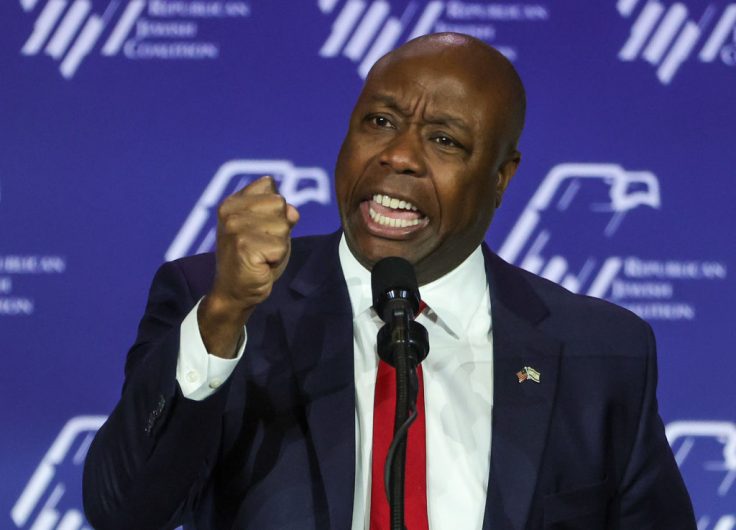A group of Republican senators on Wednesday opened a probe into the Biden administration’s decision to unlock upwards of $10 billion in frozen funds for the Iranian government, the Washington Free Beacon has learned.
The 13 lawmakers, led by Sen. Tim Scott (R., S.C.), are pressing the State and Treasury Departments to detail exactly how much money Iran will be permitted to access in the next several months under a sanctions exemption that permits Iraq to transfer electricity payments to Iran via third-party countries. The White House renewed the waiver in March, days before it was set to expire.
"The United States should be restricting Iran’s access to currency abroad," the senators wrote, according to a copy of the letter obtained by the Free Beacon. "Instead, your administration is expanding it, all while continuing to share limited information on a strategy to restore deterrence in the Middle East with Congress or the American people."
The letter follows a bevy of congressional action on the Biden administration’s dealings with Tehran, including an August 2023 effort led by Scott to unearth details of a $6 billion hostage deal with Iran. Scott also championed the Revoke Iranian Funding Act, a bipartisan bill to freeze the $6 billion released by the Biden administration as part of last year’s deal with Tehran.
The sanctions waiver, which has drawn fierce Republican opposition on Capitol Hill, allows Iraq to bypass tough American sanctions by converting dinars into euros and transferring payments into Iranian bank accounts in Oman and several European nations.
Though Iran is technically only allowed to access the funds for humanitarian purposes, Scott and his colleagues note that the waiver nonetheless "makes restricted Iranian funds more accessible to the Ayatollah’s regime, at a time when Iranian-backed aggression in the region is at a peak."
Since Hamas invaded Israel on Oct. 7, Iranian proxy groups have stepped up their attacks on American positions in the region, including a January missile strike by Yemen’s Houthi rebels that killed three American service members.
Moreover, the latter states that the Biden administration "appears to be disregarding congressional intent that any payments made to Iran remain severely restricted."
"It is unfathomable that this is the context in which the administration determined that it was within the national security interest of the United States to waive sanctions on restricted Iranian funds, making them more accessible to the regime. If we want to actually restore deterrence in the region, those funds should be placed further out of Iran’s reach, not closer."
To date, the Biden administration has authorized "three waivers related to Iraqi electricity payments that authorize funds to be transferred outside of Iraq and for those funds to be denominated in euro," the lawmakers wrote.
They further note that the waiver "appear[s] to be in direct conflict with the statutory requirement" included in the Iran Threat Reduction Act, a 2012 law that requires Iraq to keep Tehran’s funds inside the country, limiting that manner in which Iran could access hard currency,
The senators are asking the State and Treasury Departments to "identify the total amount of restricted Iranian funds" that have been converted into euros and moved into other countries, including France, Italy, and Oman. They also ask the Biden administration to disclose every bank in those countries authorized to convert restricted Iranian funds.
"Given the fungibility of money, please explain why the administration would provide Iran with increased access to hard currency, particularly euros, which are far more valuable to Iran than locally demonstrated currencies like the Iraqi dinar," they write.
The Biden administration must also explain how it "is in the national security interest of the United States" to grant Iran fresh access to funds as it foments terrorism against the United States and its allies, chiefly Israel.
Scott’s probe is backed by several Republican foreign policy leaders, including Sens. Ted Cruz (R., Texas), Tom Cotton (R., Ark.), Marco Rubio (R., Fla.), Chuck Grassley (R., Iowa), and Rick Scott (R., Fla.), among others.
